Idolatry and Poverty: “idolatry comes naturally to us" (samples from a chapter in Wasted Evangelism)6/25/2017 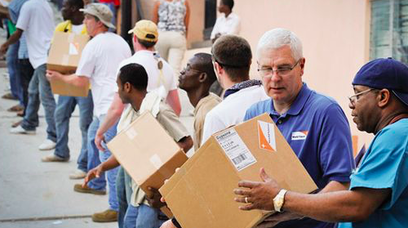 Christian responses to poverty often draw from the Sermon on the Mount (Matt 5–7; Luke 6), further substantiated by other NT teaching (e.g., Acts 2–4; Jas 1–2). Although important, this tends to be applied more to church-life and to the private sphere rather than developing a response to those living with the effects of poverty. Others turn to the Pentateuch and the Prophets, and, rightly so, for such biblical material is rich in addressing the issues of poverty. The results, however, can tend toward justification for political alignment and socio-economic policies (right/left, conservative/liberal). Christians across the spectrum wrestle with how the Pentateuch and the prophets apply in the (post)modern world. Many question the contemporary relevance of such documents of antiquity addressed to an ancient nation whose social-political location is the Ancient Near East. Nonetheless, there is a way to decipher the significance of OT ethical texts, namely to draw significance from their incorporation into the gospel itself. Mark draws upon a fascinating range of OT contexts throughout his narrative that juxtapose idolatry and the economically vulnerable. Although Mark’s use of the OT is extensive beyond these particular texts, he embeds his Gospel with OT contexts related to the economically vulnerable, whether Law, land-stipulation, or prophetic announcement, which also contain, within the context or flow of thought, mention of idolatry. 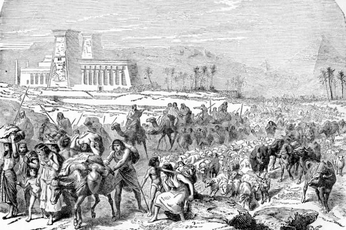 The juxtaposition of idolatry and poverty in Exodus and the memory-judgment context in Malachi bear out the apologetic framework discussed above. Additionally, Mark’s constant use of Isaiah also reinforces this framework, which is particularly vivid in Isaiah 40, a component of Mark’s programmatic summary. Mark’s Isaiah referent itself--A voice is calling, “Clear the way for the Lord in the wilderness; make smooth in the desert a highway for our God” (Isa 40:3; Mark 1:3)—carries imagery common to Isaiah’s world, reflecting the procession of ANE monarchs. Here, Yahweh comes as Victor-king, announcing the Good News (v. 9), where all flesh will see the glory of the Lord (v. 5). Isaiah 40 then compares Yahweh to surrounding idolatrous nations, which are like a drop from a bucket (v. 15) and are as nothing before Him . . . less than nothing and meaningless (v. 17; note v. 23). Mark’s introduction contrasts the gospel to the concept of the imperial cult of Caesar linking it with the apologetic of Isaiah, emphasizing the incomparability of Yahweh, whose sovereign power over creation is boasted of (v. 12) and affirmed to be in need of no-one’s counsel regarding justice (vv. 13–14). Yahweh is distinct from the image-bearers made of gold and silver who need to be fashioned by human-hands (vv. 19–20), for he sits above the circle of the earth and stretches out the heavens like a curtain (v. 22). The Holy One takes on all-comers: To whom then will you liken Me that I would be his equal? (v. 25). Isaiah notes the starry hosts (v. 26), each representing idolatrous pagan powers, yet it is Yahweh who created them and calls them by name, indicating his might and strength over the idols of the nations.  Mark’s consistent references to OT material that juxtaposes idolatry and the poor is certainly embedded into the very nature of the gospel, suggesting that the gospel is formative for social arrangements. Mark’s highlighting of these OT texts that juxtapose idolatry and expectations regarding the poor, as well, points to an apologetic and evangelistic potential for social action. Still, moving from ancient text to significance to application can be very difficult, especially as we consider how the application of such texts can include social action outcomes. At the risk of over-generalization, even Christian approaches to poverty tend to align with political views, party affiliations, and social-locations: Politically conservative Christians tend to read capitalism, free markets, and individual charity as biblical solutions to poverty; the politically liberal tend to read more public, state-centered solutions. Although both find some textual support, neither consider the biblical juxtaposition of idolatry and poverty, nor our own human capacity for idolatrous alignments in our own social-locations. L. T. Johnson reminds us that “idolatry comes naturally to us, not only because of the societal symbols and structures we ingest from them, but also because it is the easiest way for our freedom to dispose itself.” Shifting the issue of poverty to the realm of discipleship and apologetics focuses our attention on the social-location of non-poor Christians and their relationship to the poor. In light of the gospel framed by Mark, non-poor Christians should be mindful of the idolatries that can form their own social reality, particularly those experiencing everyday life in places where poverty is not concentrated (i.e., non-urban life). It is not necessarily how OT ethical texts apply to our modern social-location (although important) that is significant, but how the apologetic nature of the idolatry-poverty juxtaposition relates to those who are to be formed by the gospel, then, how that significance dissuades Christians from conforming to any private vs. public dichotomous response to poverty.
1 Comment
 The basic dictionary definition of social action is “individual or group behavior that involves interaction with other individuals or groups, especially organized action toward social reform.”[1] Within the discipline of sociology the concept is associated with the work of Max Weber, who understood social action in terms of the relationships people have between social structures and the individuals whose actions create them.[2] Acadia University professor Peter Horvath defines social action as “participation in social issues to influence their outcome for the benefit of people and the community” and concludes that “[s]ocial action can, under favorable circumstances, produce actual empowerment, impact, or social change.”[3] Horvath underscores the importance of seeking and implementing necessary change on behalf of others who do not have access to power for needed change. This can be seen within the social service and welfare arena in which the term “social action” is often used simply to mean efforts to improve social conditions or to address the needs of a particular group within a social setting or societal structure. Social action can be understood as attempts to improve human welfare and to develop commitment to each other, advocating for and/or making changes in social structures (whether at the individual, community, or legislative levels) for the betterment of all. Social action, therefore, is principally the means by which one group offers alterative means to an end for another group, taking action or advocating for action to address social issues and community life. Within the context of poverty, social action is not merely charity, alms-giving, or the transfer of wealth. It is actions taken to address relationships between the poor and the non-poor and, as well, the relationship between the poor, the social structures that can cause or promote poverty, and individuals or groups whose actions create those social structures. Social action is, therefore, associated with actions taken by individuals or groups on behalf of others, in particular advocating on behalf of marginalized or powerless individuals or groups whose access to the systems of power are limited or nonexistent.[4] What, then, is evangelistic social action? Throughout the studies in Wasted Evangelism, I frequently reference Mark’s programmatic[5] use of OT contexts regarding the economically vulnerable and the land, particularly contexts that reference Exodus land-laws (e.g., Exod 21–23; Mal 3:1–5; Jer 5:2; 7:9; Amos 4:1–2; etc.), which, for Mark, informs his understanding of the gospel (Mark 1:1–3; note Exod 23:20; Mal 3:1). The Exodus land-laws are operating behind his programmatic theme, informing the reader/listener of the gospel’s content (i.e., what the gospel is and what it means). Land-laws were given to ensure that the economically vulnerable (i.e., the land-less) were full participants in the benefits of living in the land.[6] This supports the importance of considering the poor in relationship to the Christian community’s social context. In light of Mark’s association of the kingdom with the gospel (1:14–15) and the gospel’s programmatic association with the Exodus land-laws, I propose that biblical social action is a means to ensure that the blessings and benefits of living in society reach to the poor.[7] Stephen Mott, former Professor of Christian Social Ethics at Gordon-Conwell Theological Seminary, points out that the Bible speaks of what is called “social action” in terms of carrying out justice and caring for the needs of the weak. In her book, Social Justice Handbook, Mae Cannon affirms a similar understanding of the biblical concept of social justice: The resources that God provides were made available to his people from the very beginning. Justice is expressed when God’s resources are made available to all humans, which is what God intended. Biblical justice is the scriptural mandate to manifest the kingdom of God on earth by making God’s blessings available to all.[8] As my Wasted Evangelism, that is, the six deep, exegetical studies (i.e., the chapters), affirm, social action is a relevant and legitimate evangelistic activity when it promotes actions and outcomes that demonstrate the inaugural presence of God’s rule and reign over creation. Thus, social action, the advocacy and activities on behalf of the economically vulnerable, should be an intentional component of a church’s task of evangelism. A slightly adapted set of paragraphs from my book, Wasted Evangelism: Social Action and the Church's Task of Evangelism. All royalties received from sales of Wasted Evangelism go to support our church plant in The Hill community of New Haven, CT. Further Wasted Blog on Barriers to discussing biblical, evangelistic social action >> Barriers [1] Social action. Dictionary.com. Dictionary.com Unabridged. Random House, Inc. http://dictionary.reference.com/browse/social action (accessed: May 27, 2013).
[2] Weber, Economy and Society, 1:78; also see Weber’s Theory of Social and Economic Organization for an in-depth understanding of his social theory, which includes his view of social action. [3] Horvath, “ Organization of Social Action,” 221–31; also see Townley et al.,“Performance Measures,” 1045–72. [4] What is being advocated for throughout [my] six studies is biblical social action that addresses the needs of economically vulnerable individuals and families and activities that seek to reduce the causes of poverty. Although [Wasted Evangelism] does not intend to endorse any particular method or specific type of activity for evangelistic social action, I feel compelled to stress the importance of community development models over paternalistic methods of charity or wealth distribution. I am grateful to Doran Wright, pastor of Grace City Church Bridgeport (CT), for recommending to me A Heart for the Community: New Models for Urban and Suburban Ministry (John Fuder and Noel Castellanos, eds.) as a text that underscores the importance of Christian community development for addressing the needs of poor neighborhoods and communities. Also, see Lupton’s Toxic Charity. For a catalog of various social action and anti-poverty related ministries see Mae Elise Cannon’s Social Justice Handbook. [5] By “programmatic” I mean that a concept, phrase, or an event described in the text contains a main theme of Mark’s Gospel, which offers a referent for meaning, definition, and/or content (an internal hermeneutical orientation) that Mark sets forth, assisting his audience to understand more clearly the parts or plotline of the story in view of the whole story. [6] See Brueggemann’s The Land regarding the biblical responsibilities of God’s people to the land and to the land-less (i.e., the economically vulnerable and the poor). [7] See chapter 2, “Wasted Evangelism.” [8] Cannon, Social Justice Handbook, 22.
When Jesus called his disciples to “follow me and I will make you become fishers of men” (Mark 1:17), most assume a positive evangelistic outcome of reaching people for Christ. Nothing could be further from the reality behind Jesus’ intentions in calling out followers to be such witnessing-fishers. At least the benign, banal application of making this verse a proof-text for “witnessing” is a shallow and narrow application of Jesus’ powerful imagery cast in this tremendous text.
Tax collectors are outsiders; rich they might have been, but they were in the eyes of temple leadership, traitors to God and to God’s people. Yet, the sinners are most certainly the uneducated serfs and peasants, farmers, and those who lived on the margins of life in and around Jesus’ house in Capernaum of Galilee (2:15). One cannot spin from this text a general characteristic that “sinners” are all sinners anywhere you find them. As are the "tax collectors," they are a specific demographic associated with those living as the poor and marginal of Jesus’ day. Jesus’ response, then, takes on an ominous shadow—a fisher shadow, standing on the shore, cast into the waters of those that are "healthy." True fisher-followers of Jesus will not rationalize their standing in the community nor their affluence, but will count their privilege, their advantage, at the disposal of the “sick” who need a physician. Paul is not far from the same imagery when he describes how Jesus took his advantage (his privilege) and gave it all on behalf of all those with the greatest of disadvantage. Have this attitude in yourselves which was also in Christ Jesus, who, although He existed in the form of God, did not regard equality with God a thing to be grasped, but emptied Himself, taking the form of a bond-servant, and being made in the likeness of men. Being found in appearance as a man, He humbled Himself by becoming obedient to the point of death, even death on a cross (Phil 2:5-8). Most likely Amos 4:1-2 is one of the underpinning Old Testament referents that would have given the disciples a frame, a rather menacing edge, for understanding the potency of Jesus’ call on their lives. In view of the inclusion (contextually) of Amos 4:1, namely the “cows of Bashan” referent, I have become wary of the poorly distributed resources, talents, and wealth among the richer, more affluent churches at the expense of the poorer churches, neighborhoods, and urban mission fields. By “expense” I am thinking biblically, not culturally, socially or (heaven forbid) politically, nor through the lens of class, but by the very New Testament discipleship implications, namely that those with advantages (“privilege,” if I may) who are called by their association with Jesus to help those who are at a disadvantage. The assumption that it takes more money to reach the rich and affluent than the poor is turned on its head by the very presence of the Kingdom (cf. Mark 1:17 with Mark 1:14-15). A more gospel-centered and mature view of discipleship seem to argue that it takes far more resources to go into the poor urban fields to bring forth a harvest for the gospel of the kingdom. These are under-resourced communities in every imaginable aspect of life. As affluent Christians, we tend to justify our station in life as a combination of gift and hard work and hear any talk of “privilege” as a justification of those of lesser means, with poorer gifts, and perhaps, with what we perceive, a lesser work ethic to grab what we have for themselves. Is there no wonder the affluent in the days of both Amos and Jesus attempted to rid themselves of the troublemakers who upset the "healthy's" status quo? This will be the lot of fisher-follows of Jesus in any culture. Following Jesus, as the gospel is imagined by Mark (and the other Gospel writers), put us at odds with everything we hold dear, in particular those who have the advantage in resources are to empty themselves on behalf of those who are at a disadvantage (cf. Phil 2). The fisher-follower mission is toward the sick (of our society), not the healthy (in our society)—toward the disadvantaged and not the advantaged. Michael Card prophetically reflects this Marken view of Jesus and the gospel in the words of his song, The Stranger:
For a youtube of Michael Card's "The Stranger" >> Click here *See chapter 3, “‘You Will Appear as Fishers’ (Mark 1:17): Disciples as Agents of Judgment,” in my Wasted Evangelism for a further and more detailed study of the Mark 1:17 “fishers of men” passage.
Read the chapter in my Wasted Evangelism: Social Action and the Church’s Task of Evangelism: “A Prelude to Judgment (Mark 3:20-35): The Beelzebul Episode and Its Significance for Evangelistic Social Action”
 R.T. France concludes that the “Mark has declared his hand” in the opening verses of his Gospel [1:1-3], setting the framework in which we are to understand his whole story. We accept that Mark has drawn into his Gospel the motifs of God’s dominion, the Exodus, exile, the Spirit, and idolatry. What is undervalued, overlooked, or even ignored is that the same context that contains these obvious correspondences [from OT contexts in Exodus 23, Malachi 3, and Isaiah 40], likewise, includes direct references regarding socio-economic relationships and community responsibilities toward the poor and vulnerable. [From the chapter on Mark 4, "Wasted Evangelism: Social Action Outcomes and the Church’s Task of Evangelism" in my book, Wasted Evangelism.] 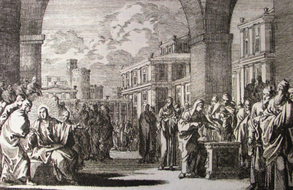 Often much is made of the coinage, the two mites, in the Poor widow story in Mark 12 (see v. 42). Many assume, too quickly, that the widow’s offering is placed “voluntary” in one of the thirteen trumpet-shaped vessels used to receive the various offerings by those entering the temple courts. Some offerings were obligatory, related to the temple tax and sin offerings; some were free-will and contributions of charity. Nothing in the text necessitates that the widow’s offering was voluntary. In fact, the scene and the wider context suggest that the two coins (leptons), which equaled a quadran, were more likely related to the temple tax or sin offering than to the voluntary free-will offering. The widow’s offering was worth less than one hundredth of a denarius or one hundredth of a day’s wage. This amount was capable of purchasing a “handful of flour.” According to OT Levitical provisions, if someone’s means are insufficient for even the two turtledoves or two young pigeons, then a tenth of an ephah of fine flour may be substituted for the sin offering (Lev 5:11; 14:21–32). Interestingly, there is also evidence that some temple authorities had viewed the offering of flour with contempt: Once a woman brought a handful of fine flour, and the priest despised her, saying, “See what she offers! What is there in this to eat? What is there in this to offer up?” It was shown to him in a dream: “Do not despise her! It is regarded as if she had sacrificed her own life” (Lev. Rab. 3.5).  The presence of the two coins in the scene emphasizes the widow’s condition of poverty and suggests her disadvantage (her standing or status) before the leaders in the temple courts, who were to be her advocates, but only had contempt for her. In addition to experiencing the loss of her spouse, making the widow one of the more vulnerable in Israel, she had been placed into this humiliating predicament by the established authorities and their banking system. The people and system had rendered her estate/house “devoured” by requiring the widow to contribute to that very system her remaining means (i.e., the last of her funds) to live. Jesus condemns the duplicitous temple leadership, their malicious behaviors (12:40c), and the temple system (13:2) that worsened the poor widow’s condition (12:44c) and left her resources now completely “devoured,” which was represented in the poor widow giving her last two coins. Note: Another possible reading for the contrast Jesus made between the surplus of the wealthy and the widow’s last two coins might suggest that those with the surplus have an oblivious detachment (malicious or banal) from the plight of the poor widow whose life was about to be devoured—they have surplus and her whole life will be devoured—and that those who are called to observe the contrast (i.e., disciples and readers/listeners) are not to do the same. Adapted from chapter 1 of Wasted Evangelism, "Widows in Our Courts."
 We do not typically approach the subject of evangelism and social action impartially, but with political, demographic, and religious preconceptions and biases. Opening up a conversation to re-assess the nature of evangelism is difficult, especially when social action and issues of poverty are injected into the discussion. The intent of Wasted Evangelism is not to debate the subject, or to review the history of the various positions regarding evangelism and social action, but to offer an exegetical and biblical theological approach to the question, Can social action be evangelism? It is important, nonetheless, to recognize there are barriers that can militate against an open discussion on the subject of evangelism and social action. For many, the meaning of evangelism is self-evident because of its association with “proclamation” activities (e.g., preaching, proclaiming, witnessing, etc.). Evangelism’s etymological relationship to the term “good news” (i.e., the evangel) can box one into defining evangelistic activity as passing on information, that is, to tell, preach, or share the news of Jesus Christ—that is, to evangelize. For many conservative evangelical Christians defining evangelism any other way causes the gospel (i.e., the news) to lose its meaning, robs the people of this important information, and diminishes the work of salvation in Jesus Christ. Evangelism’s strong association to the news of the gospel suggests to some that anything outside verbal, cognitive-based activities is a threat to the fundamentals of the faith. Additionally, those who have the highest interest in evangelism are often those least interested and least skilled in critical, theological reflection. Since evangelism is understood as a self-evident activity, rarely is the subject examined exegetically or evaluated theologically, but is usually consigned to matters of practical theology (e.g., missions, preaching, personal witness, church outreach programs, and church growth). (Meaning is often confused with application.) This, then, does not promote biblically relevant criteria to precede the discussion and, thus, limits the possibility of new, creative, and potentially sound understandings of biblical evangelism. Within evangelical circles, to advocate that social action can be evangelism is challenging, for such subjects as poverty and the poor are often relegated to the private sphere. Therefore, anything related to the public arena of rights, laws, and taxes or the confronting of social or governmental systems on behalf of the poor are often associated with the “social gospel” and the theologically liberal church. Although historically the church was deeply involved with issues of poverty, a “great reversal” took place between 1900 and about 1930. Evangelical fundamentalists turned away from their social responsibilities as a reaction against the social gospel that was perceived to be aligned with liberalism, which had diminished Bible infallibility and inspiration and weakened biblical views of sin, hell, salvation, and the deity of Jesus. When civic and political social concerns became suspect in the minds of evangelical academics and popular revivalists, social action responsibilities took on a minor role for much of the evangelical Christian community. Anything associated with the social gospel was considered a distraction and, to some, a betrayal to the fundamental essence of the gospel (i.e., the information, that is, the news of Jesus Christ). This history spills over into any contemporary discussion on evangelism and social action. There are also demographic barriers to an open discussion regarding the association between evangelism and social action. Over the last seven decades, people have been moving out of urban centers and into the suburbs, including Christians and their churches. The twin demographic forces of urban flight and suburban sprawl contribute to the evangelicals’ disassociation with issues of poverty and the poor. As a result, this social transformation helped reinforce a one-dimensional understanding of the gospel [see note below], which determines, for many, the nature of evangelism. Suburbanization of American society has moved much of the evangelical communities of faith outside populations affected by poverty. Rather than church communities promoting social action on behalf of poorer communities, the (upward) mobility of American families toward the suburbs demand that suburban churches serve a socializing and stabilizing function. Not a very likely set of social forces that will generate social change on behalf of the economically vulnerable hidden outside their neighborhoods and unknown within their circles of friends and acquaintances. The barriers reviewed here are not exhaustive, but are limited to those most relevant to the arguments and conclusions of the studies found in Wasted Evangelism. To overcome these barriers, these studies focus our attention to the text of Scripture, particularly the Gospel of Mark, as a basis for entering into a discussion on the biblical relationship between evangelism and social action. *From the "Introduction" to Wasted Evangelism. [Note] A one-dimensional gospel indicates solely a person/God dynamic relationship; whereas a multi-dimensional gospel includes the person/God dynamic and, also, creation/God, person/creation, and person/person. Wasted evangelism considers the multi-dimensional gospel more representative of a biblically sound narrative definition of the gospel. I begin my book, Wasted Evangelism, Whenever someone attempts to redefine terms like “gospel” or “evangelism,” one must tread carefully for hallowed ground is being disturbed and sacred pillars are being moved. 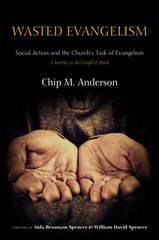 I am fully aware, with my book and with this site, that I have entered a debate on the subject of evangelism and social action that has a history of polarizing positions, in which relationships can become strained or, all too often, severed. I recognize that I have made conclusions in Wasted Evangelism and will promote, even advocate, for positions, actions, and outcomes here on this site that will make many within my conservative and evangelical Christian family uncomfortable. My hope is, nonetheless, that the studies in Wasted Evangelism (for those willing to plough through its 6 studies) will cause many to dig deeper into the text, specifically the Gospel of Mark, to hear what the Bible says about the relationship between the gospel, evangelism, and social action. And, that the content of this site will provoke Christians and the Christian community to take up social action as a means to illustrate and realize that God’s kingdom has broken into time and space through the appearing of his Son, Jesus, the Messiah. The purpose of this site and the principles behind Wasted Evangelism is to connect Christians and churches . . .
In my first interview after the release of Wasted Evangelism, I was asked: In The Hobbit, Gandalf tells Bilbo Baggins that if he does come back from his journey, he will not be the same – a quote you use. Has your journey to the start of this book changed you forever? I heard that dialog in the movie and I felt it best described the journey I have been on, not just in writing Wasted Evangelism, but in social action, a the journey I want others to take—a journey through the Gospel of Mark and entering paths that get them much closer to those living in poverty.
Wasted Evangelism is the result of a seven-year journey in Mark’s Gospel, seeking to determine the relationship of the gospel to the wider biblical material regarding poverty and justice. For me, this was no mere academic exercise alone, but a deeply spiritual one that made it clear to me that the church has a biblical responsibility to be intentionally involved in social action. For me, not only has social action been my profession, it has been an important part of my spiritual journey as well. Over these years I have come to realize there is a wide gap, a very unbiblical breach, between the issues of poverty and my evangelical Christian community. For many years I lived out my faith at the far “right” end of that gap. For the last sixteen years on the other side of this gap I have had the privilege of working with people dedicated to moving our economically vulnerable neighbors, often trapped in poverty, toward self-sufficiency. As a result of experiencing both ends of this gap, I often find myself alone in most any room I am in. Among my peers and colleagues in social action I am extremely conservative as an evangelical Christian, sometimes even politically suspect; among my conservative Christian family I am often viewed as too liberal regarding social action and the gospel, sometimes even borderline heretical. During the summer of 2006 I began to seek out my own biblical rationale for my new vocation in community action—I wanted some personal justification from God’s Word that my faith should be legitimately connected to my work in social action. Wasted Evangelism is a reflection of that search. As Gandalf said to Bilbo Baggins, I can’t guarantee a safe return—seriously the wading into the swamps, caves, rugged mountains, and precarious valleys (using Tolkien’s middle earth imagery) of the world of poverty is not safe. It is dangerous. The conditions themselves are not safe; the politics are not safe; the surrounding powers and wealthy will be chief in opposition, and they are not safe. Even the church itself will often be unfriendly while on the journey, nor will the church readily offer shelter. Self and status will have to be sacrificed. There is no guarantee of return. But if they, the poor rich readers, non-poor Christians, do return, they will certainly not be the same. __________ Michelle Snyder graciously provided my first interview upon the release of Wasted Evangelism: Social Action and the Church’s Task of Evangelism, on her blog, White Knight Studio. This post an excerpt from that interview. |
AuthorChip M. Anderson, advocate for biblical social action; pastor of an urban church plant in the Hill neighborhood of New Haven, CT; husband, father, author, former Greek & NT professor; and, 19 years involved with social action. Archives
February 2024
Categories
All
|
Pages |
More Pages |
|
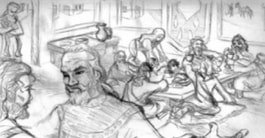
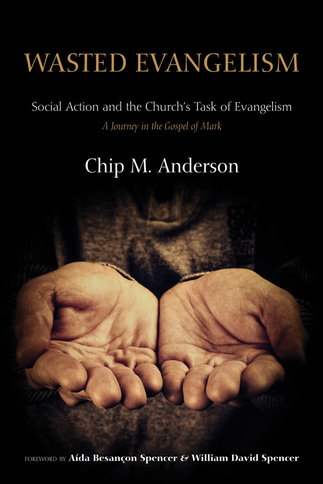
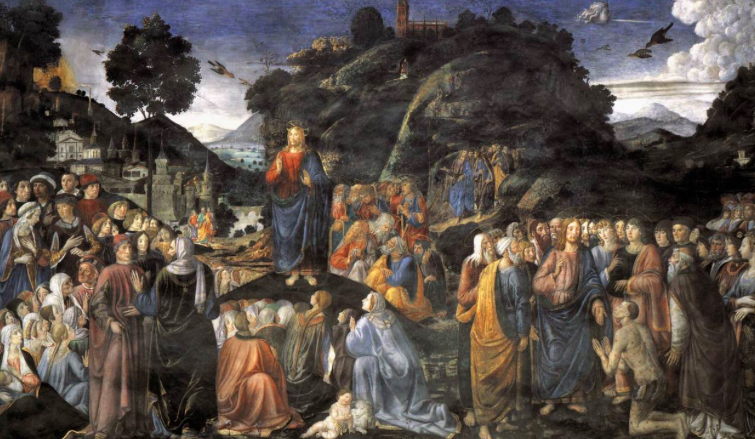

 RSS Feed
RSS Feed